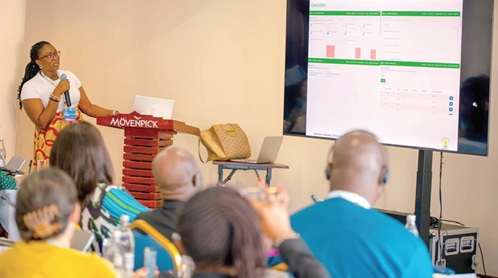
National Malaria Elimination Programme digitises data collection
The National Malaria Elimination Programme has digitised its data collection of malaria social and behaviour change (SBC) activities to track progress of all events, including work done by NGOs.
This would not only enable the programme to implement community level sensitisation and advocacy, but also fast-track collection of data, provide easy access to SBC data and serve as a central platform to view summary of all data collected.
A Social Behaviour Change Specialist of NMEP, Eunice Mintah-Agyemang, made this known in a presentation titled “Digitising reporting for malaria community level engagement activities by CSOs” at the annual meeting of the SBC Working Group of Roll Back Malaria (RBM) Partnership to End Malaria in Nairobi, Kenya.
The meeting brought together malaria SBC professionals worldwide who shared experiences, participated in skills-building sessions, discussed emerging issues, and set the working group’s priorities for the coming year.
The three-day meeting, which was on the theme: “Insight to action,” attracted about 130 participants from 30 countries, including Ghana.
Malaria SBC reporting system
Mrs Mintah-Agyemang said in Ghana, local CSOs and NGOs were engaged mainly to coordinate social or community mobilisation activities, which was one of the key malaria SBC strategies.
She said the Global Fund had been supporting organisations since 2018 to undertake community-based SBC activities, adding that the NMEP engaged 65 NGOs to work in districts across the 16 regions in the country.
The specialist explained that the NGOs focused on social mobilisation and community sensitisation activities, using multiple channels and approaches with support from health workers and community leaders in the respective areas.
She said that before the deployment of the digital system, data collection and reporting by the CSOs and NGOs were mainly paper-based which had quality issues, lacked visibility and had difficulties in accessing and tracking performance, including showing data evidence of work.
Benefits
Mrs Mintah-Agyemang, however, said that the SBC digital reporting system which was piloted and deployed in 2023, had “helped to improve data collection and reporting and offered the opportunity to assess the activities implemented at the community level by NGOs.”
For instance, she said SBC activities conducted through schools, churches and mosques, among others, increased from 6629 in 2022, to 9178 in 2023, with the number of people reached increasing from 423,785 in 2022 to 697,253 in 2023, while the number of pregnant women identified, and followed up, increased from 19,844 to 27,266, between 2022 and 2023.
Furthermore, she said the system gave a holistic view of activities implemented by the CSOs and NGOs.
Human-centred design
In another presentation titled “Don’t wait for the symptoms: A community-centred approach to malaria programming through Human-Centered Design (HCD), a Social Behaviour Specialist from Cambodia, Socheata Kong, said an SBC intervention was designed with communities in three provinces in Cambodia to increase perceptions of norms and social support among forest-goers for malaria testing after leaving the forest.
She said during May-December 2022, the number of malaria tests of forest-goers by Village Malaria Worker (VMW) during the intervention period was 12,338, an increase of 76 per cent compared to the same period the previous year.
